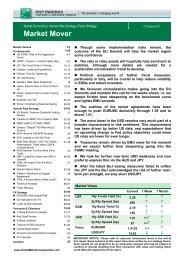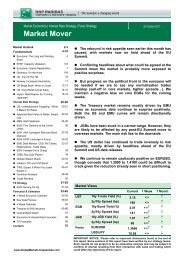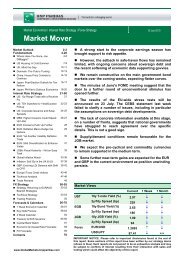Market Economics | Interest Rate Strategy - BNP PARIBAS ...
Market Economics | Interest Rate Strategy - BNP PARIBAS ...
Market Economics | Interest Rate Strategy - BNP PARIBAS ...
You also want an ePaper? Increase the reach of your titles
YUMPU automatically turns print PDFs into web optimized ePapers that Google loves.
Japan: New Cabinet and Policy Outlook<br />
• Prime Minster Kan has reshuffled his<br />
cabinet to avert an opposition boycott of<br />
parliament. But with all parties gearing up for<br />
the local elections in April, the going promises<br />
to be tough for the 2011 budget and budgetrelated<br />
bills.<br />
• That said, Kan’s tenure could prove long,<br />
given that no national elections are due until<br />
2013. Because it is politically damaging for the<br />
opposition to keep on blocking bills and be seen<br />
as the cause of political paralysis, policy<br />
cooperation on specific issues seems likely<br />
once the April local elections are over.<br />
• The policies most likely to garner supraparty<br />
support are (1) comprehensive social<br />
security/tax reform and (2) “opening Japan”<br />
(Trans-Pacific Partnership participation).<br />
• The appointment of Kaoru Yosano as the<br />
point man on social security/tax reform should<br />
help reconcile the ideas of the opposition and<br />
ruling camps.<br />
• Opening up Japan and TPP participation,<br />
however, face strong opposition from factions<br />
in both the DPJ and LDP. Headway on this issue<br />
may be blocked or could trigger political<br />
realignment.<br />
More “crises” down the road?<br />
Prime Minster Kan reshuffled his cabinet and the<br />
DPJ leadership on 14 January. With the opposition<br />
threatening to boycott the regular session of<br />
parliament set to convene on 24 January unless<br />
Chief Cabinet Secretary Sengoku and Land Minister<br />
Mabuchi were replaced (they had been censured by<br />
the opposition-controlled Upper House), the sacking<br />
of both allowed Kan to avert a “January crisis”<br />
(opposition boycott of parliament).<br />
But now the new government faces even bigger<br />
challenges as it lacks the two-thirds majority in the<br />
Lower House needed to override bills rejected by the<br />
Upper House (it is seven seats short). With the<br />
opposition gearing up to fight the ruling coalition in<br />
the unified nationwide local elections slated for April,<br />
the going promises to be rough for the 2011 budget<br />
and budget-related bills. These are being dubbed by<br />
pundits the “March crisis” and “April crisis”,<br />
respectively.<br />
We expect there will be a good deal of negotiating<br />
with the opposition before the budget and budgetrelated<br />
bills are submitted to the Diet. Negotiating on<br />
the specifics of any legislation is certainly<br />
constructive. However, political manoeuvring and<br />
grandstanding over how the Diet’s daily agenda is<br />
set could provoke public disgust at the procedural<br />
games parliamentarians play. Incidentally, the<br />
government has let it be known that it is open to<br />
amending the budget in parliament, something that<br />
would be epoch-making in its own right.<br />
Bigger test will be budget-related bills<br />
The government, by virtue of its majority in the Lower<br />
House, can secure passage of the budget without<br />
Upper House approval. Under the constitution, the<br />
budget is automatically enacted 30 days after<br />
approval by the Lower House, regardless of what the<br />
Upper House does.<br />
But the same rules do not apply to budget-related<br />
bills. If rejected by the Upper House, these will<br />
require some degree of cooperation from opposition<br />
lawmakers in the Lower House to achieve the twothirds<br />
majority needed for an override vote. While this<br />
process can be time-consuming, this time around<br />
there are no budget-related bills on tap that could<br />
cause the kind of confusion witnessed at the gas<br />
pumps in 2008.<br />
At that time, the provisional surcharge tax on<br />
gasoline could not be renewed on time due to the<br />
divided Diet. This led to the tax momentarily expiring,<br />
lowering gasoline prices, only to be reinstated one<br />
month later. In any event, even if the public is<br />
inconvenienced by the failure to promptly enact<br />
budget-related bills, most such bills are applied<br />
retroactively when they are eventually passed.<br />
A prime concern for market participants is a special<br />
law enacted each year that controls deficit-financing<br />
bonds. While failure to re-enact this legislation by 1<br />
April would not trigger chaos, government cash flow<br />
could be seriously impaired if the legislation is put on<br />
hold indefinitely.<br />
Increasing cooperation, once April’s election are<br />
over<br />
Ultimately, we expect the opposition New Komeito<br />
party to be won over to support budget-related bills,<br />
just as it was convinced to support the<br />
supplementary budget last year. Of course, in the<br />
run-up to the April elections, it is very likely that New<br />
Ryutaro Kono/ Azusa Kato 20 January 2011<br />
<strong>Market</strong> Mover<br />
27<br />
www.Global<strong>Market</strong>s.bnpparibas.com

















